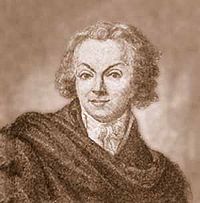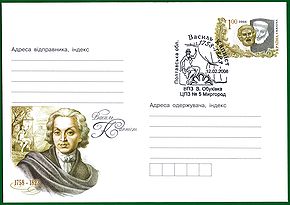
Vasily Kapnist
Encyclopedia

Russian language
Russian is a Slavic language used primarily in Russia, Belarus, Uzbekistan, Kazakhstan, Tajikistan and Kyrgyzstan. It is an unofficial but widely spoken language in Ukraine, Moldova, Latvia, Turkmenistan and Estonia and, to a lesser extent, the other countries that were once constituent republics...
.
Kapnist whose Greek speaking grandfather left Zante in Greece to fight for Peter I, was a scion of the Venetian Counts Capnissi, yet he spent all his life in the manor of Obukhovka near Poltava
Poltava
Poltava is a city in located on the Vorskla River in central Ukraine. It is the administrative center of the Poltava Oblast , as well as the surrounding Poltava Raion of the oblast. Poltava's estimated population is 298,652 ....
. His lifelong friendship with Prince Nikolay Lvov
Nikolay Lvov
Nikolay Aleksandrovich Lvov was a Russian artist of the Age of Enlightenment. Lvov, an amateur of Rurikid lineage, was a polymath who contributed to geology, history, graphic arts and poetry, but is known primarily as an architect and ethnographer, compiler of the first significant collection of...
and Gavrila Derzhavin date from the early 1770s, when all three served in the Leub Guard. Derzhavin later married Kapnist's sister-in-law and visited the poet and his wife in Obukhovka more than once.
The extension of Russian serfdom
Russian serfdom
The origins of serfdom in Russia are traced to Kievan Rus in the 11th century. Legal documents of the epoch, such as Russkaya Pravda, distinguished several degrees of feudal dependency of peasants, the term for an unfree peasant in the Russian Empire, krepostnoi krestyanin , is translated as serf.-...
to the Ukrainian lands dismayed Kapnist and occasioned his two most notable poems, Ode on Slavery (1783) and Ode on the Elimination of Slavery in Russia (1786), in which he chastised serfdom as the principal pest of contemporary Russian society. His later poems belong to the Horatian tradition, anticipating Russian Romanticism
Romanticism
Romanticism was an artistic, literary and intellectual movement that originated in the second half of the 18th century in Europe, and gained strength in reaction to the Industrial Revolution...
in their social pessimism and admiration of simple family joys.
Kapnist revealed himself as a savage satirist in his most famous work, a satirical verse drama based on the poet's litigation against a neighbour and aptly entitled Chicane (1798). His victims are the judges and officers of law, whom he paints as an unredeemed lot of thieves and extortioners. The play is in rather harsh Alexandrines but produces a powerful effect by the force of its passionate sarcasm
Sarcasm
Sarcasm is “a sharp, bitter, or cutting expression or remark; a bitter jibe or taunt.” Though irony and understatement is usually the immediate context, most authorities distinguish sarcasm from irony; however, others argue that sarcasm may or often does involve irony or employs...
.

Woe from Wit
Woe from Wit is Alexander Griboyedov's comedy in verse, satirizing the society of post-Napoleonic Moscow, or, as a high official in the play styled it, "a pasquinade on Moscow."The play, written in 1823 in the countryside and in Tiflis, was not passed by the censorship for the stage, and...
and Gogol's Inspector General, owe not a little to the crude and primitive comedy of Kapnist".

